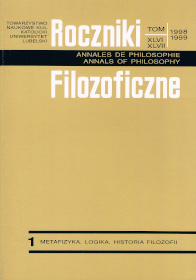Twentieth-century Epistemology: A Review of Standpoints
Abstract
The paper seeks to make a review of the main standpoints and trends in the epistemology of the twentieth century. First, the problems of philosophical epistemology are discussed in the way as it is presented in the handbooks and monographs published in the 1980s and 1990s on philosophical epistemology. Then the three main currents of 20th-century epistemology have been distinguished: 1) the scientistic current in which the tasks of philosophical epistemology is to examine the grounds of scientific knowledge: here we find neo-Kantism and neopositivism; 2) the antiscientistic trend represented by phenomenology and neoscholasticism; 3) the philosophical trends which undermine a possibility for a purely rational relationship subject object by highlighting the non-rational factors which determine that relationship, e.g. social, historical, vital-psychological and other factors. Here we find the epistemology of Marxism and neo-Marxism, views on knowledge as regards hermeneutics, existentialists, personalists, the socalled philosophy of life. The analytic philosophy of knowledge after the Second World War and so-called naturalized theory of knowledge have been analyzed separately. The discussion takes into consideration, among other things, the following standpoints of: H. Cohen, E. Cassirer, E. Husserl, W. V. O. Quine, J. Habermas, J. Derrida, R. Rorty, L. Wittgenstein, and some main problems of contemporary epistemology: fundationalism, coherentionism, skepticism, internalism-externalism, issues concerning truth, realism and antirealism. Some broader epistemological consequences of the influential standpoints as regards the philosophy of science have been discussed here: K. Popper, T. S. Kuhn and P. K. Feyerabend. Finally, the author seeks to make a diagnosis concerning some possible directions of the development of epistemology in the twenty-first century.
Copyright (c) 1999 Roczniki Filozoficzne

This work is licensed under a Creative Commons Attribution-NonCommercial-NoDerivatives 4.0 International License.





